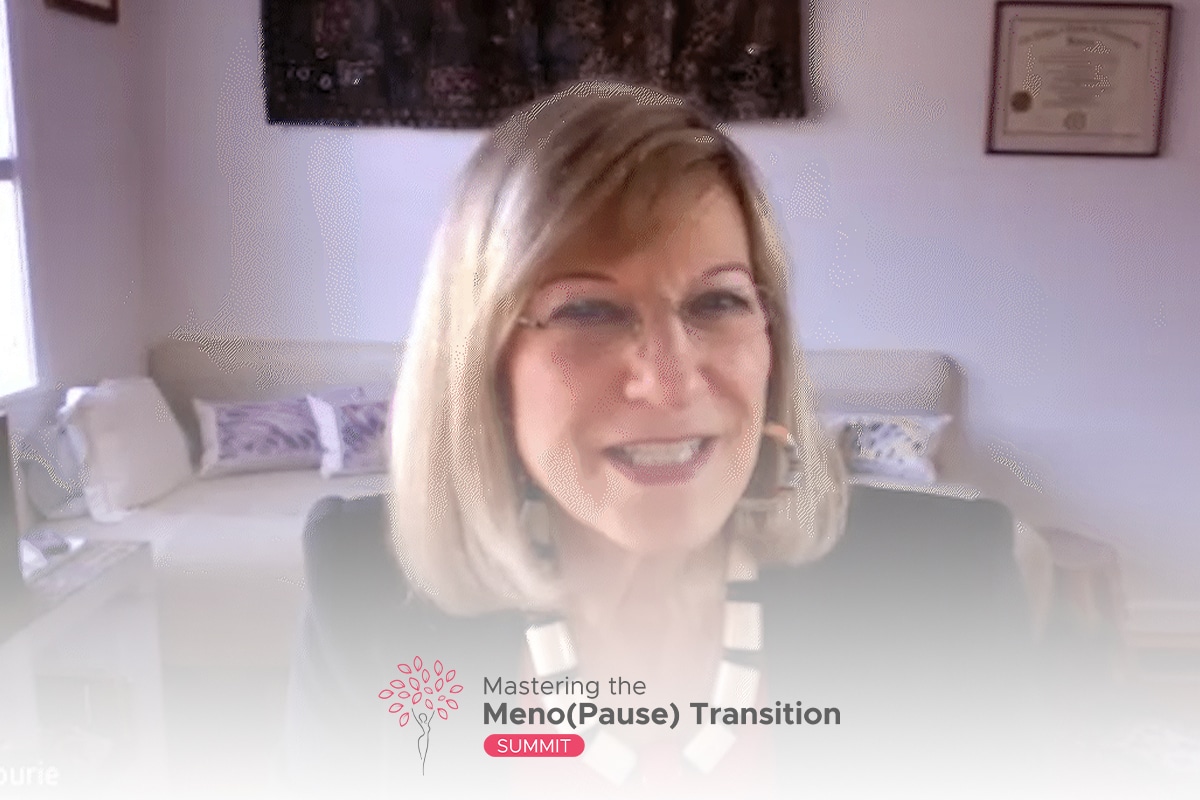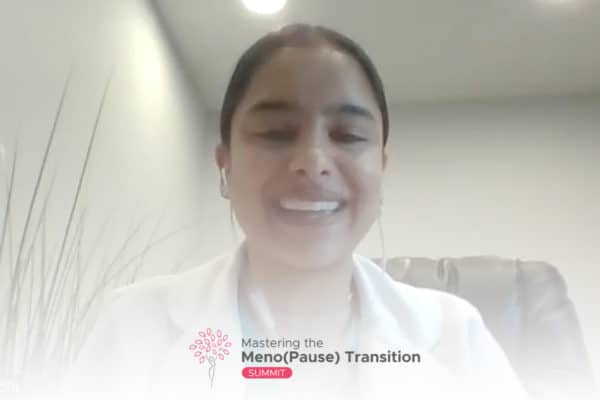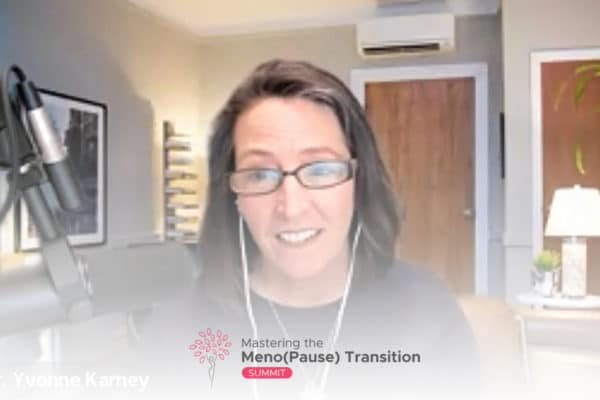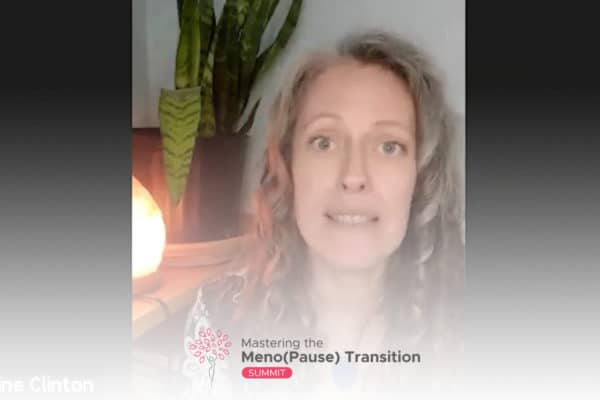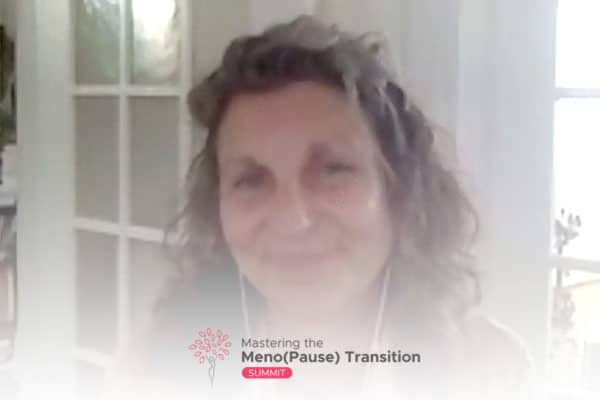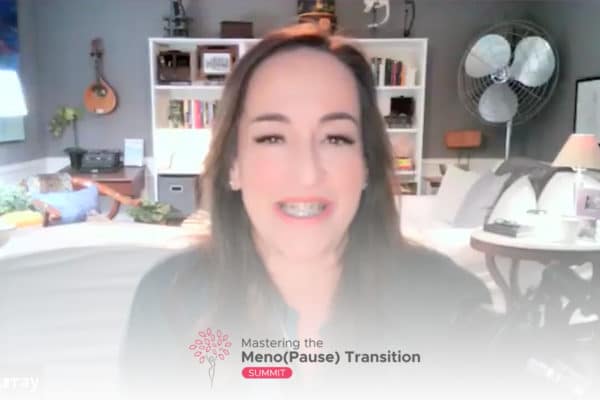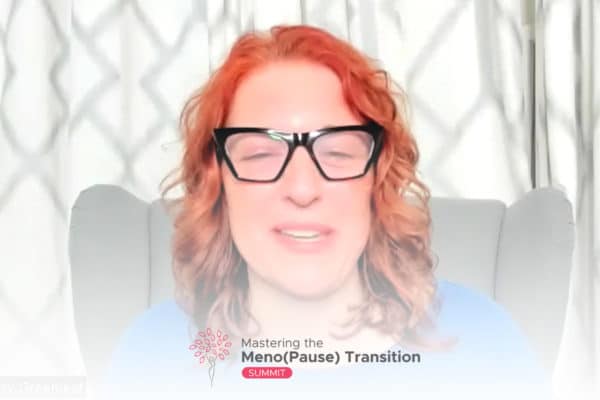Join the discussion below
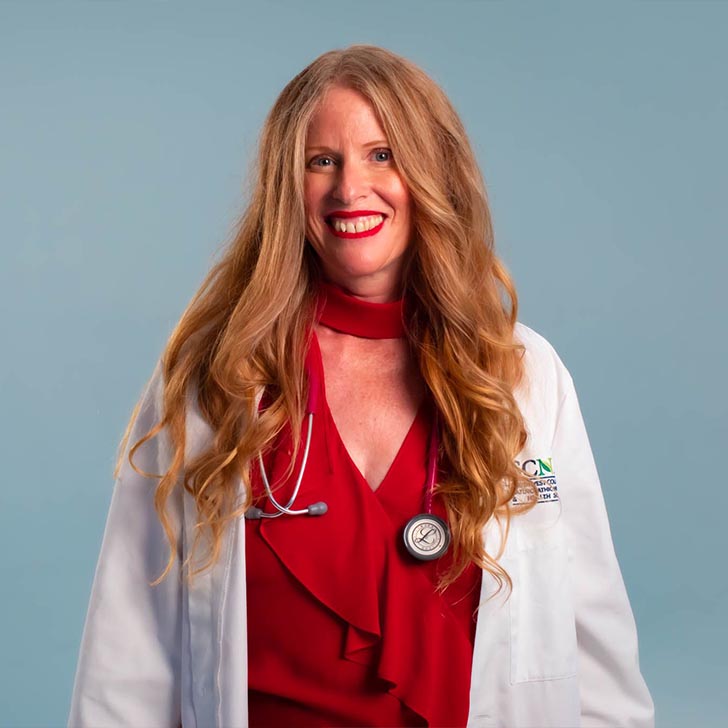
Dr. Sharon Stills, a licensed Naturopathic Medical Doctor with over two decades of dedicated service in transforming women’s health has been a guiding light for perimenopausal and menopausal women, empowering them to reinvent, explore, and rediscover their vitality and zest for life. Her pioneering RED Hot Sexy Meno(pause) Program encapsulates... Read More
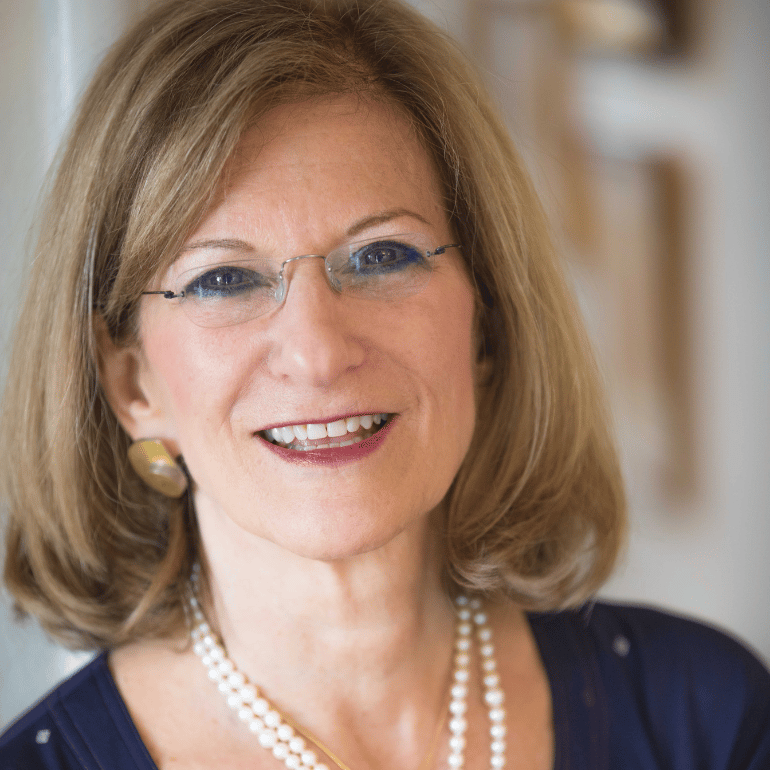
Dr. Carol Lourie is a dedicated practitioner with over three decades of clinical experience as a Naturopath, Acupuncturist, and Homeopath. She’s helped thousands of women recover their health and restore their life through her integrative and complementary protocols involving focused nutrition, targeted supplementation, lifestyle changes, and an empowered mindset. Dr.... Read More
- The health of your hormones reflects your overall health
- What steps can you take to create healthy hormones?
- Should women with a family history of breast or other cancer be on HRT?
Dr. Sharon Stills
Hello, hello. Welcome back to Mastering the Menopause Transition Summit. I’m your host, Dr. Sharon Stills. It’s nice to see you all here today. We’re gonna be talking about one of my favorite topics, which is breast cancer, because there’s so much knowledge we can give you, and share with you. And that’s what we’re gonna do today to empower you for prevention or treatment, if you do have a diagnosis. And so I have my dear friend and colleague with me to help us have that conversation, and share all her knowledge, Dr. Carol Lourie. She’s a dedicated practitioner with over three decades of clinical experience as a naturopath, acupuncturist and homeopath. You even got me beat out, and I feel like I’ve been taking forever.
Dr. Carol Lourie
Most people burn out at this point.
Dr. Sharon Stills
She’s helped thousands of women recover their health, and restore their life through her integrative, and complimentary protocols involving focused nutrition, targeted supplementation, lifestyle changes, and an empowered mindset. Her mission is to help women recover their health, to restore their life. When the mind and body work together, healing is always possible. I love that statement. Welcome, welcome to the summit. It’s a pleasure to have you here and be with you.
Dr. Carol Lourie
It’s an honor to be here, thank you so much.
Dr. Sharon Stills
You’re so welcome. So I guess before we start just a little who you are, and how you ended up personal journey. or professional journey, and what you do now?
Dr. Carol Lourie
Sure, well, I went to NCNM when it was the National College of Naturopathic Medicine. That was a long time ago. It’s been through many permutations for the better since then. And I moved to California and got my acupuncture license, and I’ve always been a homeopath. And I was always drawn to women’s health. Even from when I was little, I was always wanting to be a doctor. And I ended up at the naturopathic school because I was working in New York, in Lido Beach with a chiropractor. And this was in the ’70s before the word detox was a household word. And he was doing detoxifying diets using iridology, which is when you look in the eye, the eye is a map to your body. So I started working in his office, and I was extremely naive. A young girl came in, she had bad skin. So I’m thinking to myself, what’s the problem? Bad skin, she takes antibiotics, everything’s fine, no joke. And then she came back a month later, her skin was better. She’d lost weight. And she had lots of people coming to him who had either been harmed through regular traditional medical care, or had a problem they couldn’t be helped with, and everybody was getting better. So I started doing juicing and blended salads, and eating his way, and I lost a lot of weight and I felt great. And then one day there was this huge pile of papers.
We all have them, papers, they pile up, and I was going through ’cause I was working there, and there was this catalog to the National College of Naturopathic Medicine. And it was like, bing! So that was the beginning of my journey. I went there instead of regular medical school. And I think botanical medicine herbs, the natural way of doing things, and really getting to the root cause is such an interesting journey as a practitioner, and also to help people be curious, and discover what got you here. And when you have a chronic disease or serious illness, it’s not like when you catch a flu or a cold. Now the flu has a different connotation these days, but in the olden days, a cold or a flu, BC, before corona. So it’s like, this just appears all of a sudden, but it takes a long time before it pops up, whether it’s breast cancer, or Hashimotos, or colitis, or migraine headaches, or severe menopausal symptoms. If you are in balance and you go into menopause, you will have an easier time as you make that transition, but if you’ve been way out of balance, and you’re speeding along to menopause, it’s going to be a bumpy ride.
And the same is for breast cancer. I mean, it doesn’t just pop up. The tumor is felt or diagnosed on a mammogram, but it takes many years to develop. So I became interested in breast cancer when a colleague, and a friend had a lump, and I said, don’t worry. I’m gonna go to every treatment with you, which was an 18 month journey. And it was a big eye-opener for me ’cause we had studied about breast cancer, and cancer in school, but never this acutely. And it’s one thing when it’s in textbook, and you have to take a test. It’s another thing when it’s a dear friend, or a family member or yourself. And it was very interesting. The first time we went to UCSF, and she was there for her chemo they went to her, oh, you look a little thin. Would you like some Ensure? What’s the number one ingredient in Ensure? Glucose, and then, oh, would you like a popsicle? Do you want a hard candy? And then, oh, you’re done with the infusion.
Do you want a cupcake or a cookie? So I’m sitting there the whole time thinking, oh, my God, what is going on here? For those of you who don’t understand why I’m doing an oh, my God moment, there is this concept about cancer, which cancer given the choice between glucose or sugar and oxygen for its cancer gas tank will always choose sugar, even though it has to work twice as hard, and it gets much less ATP, or gas for the cancer gas tank. That’s known as the Warburg effect. And it was discovered in 1924 by the German scientist out of Warburg. And he won the Noble Peace Prize for Medicine for that. So that’s the beginning of cancer as a metabolic disease, which gives women a lot of power over the environment they have in their body, and the environment they have in their mind. So that was what I discovered during the 18 month journey with my friend. That was the beginning of the many discoveries that I accompanied her.
Dr. Sharon Stills
Well, first of all, I just wanna say everyone I hope listening has a friend like you ’cause what a beautiful thing to accompany her on that journey. And I think that is healing medicine alone. So if you do have a friend like that, when you’re done listening to this interview, send them some love and show them appreciation. And if you don’t, that’s okay too. Just open up to the possibility of meeting new people, and making new friends and cultivating those friendships. It’s never too late to cultivate a good friendship. I don’t think I knew that you started out in Lido Beach ’cause I used to live in Long Beach, which is right next to Lido.
Dr. Carol Lourie
We were right next door, and it was a long time ago.
Dr. Sharon Stills
And I had to chuckle because I know what iridology is because that was one of the first things I studied along my journey towards becoming a naturopathic physician with Bernard Jensen.
Dr. Carol Lourie
Oh, yeah, absolutely, yeah, he was one of the originals.
Dr. Sharon Stills
Yes, and I went and studied with him, and we bought all the cameras, and we used to look in patient’s eyes.
Dr. Carol Lourie
Yeah, I love that. Do you ever do that now? Do we ever look in the eyes as a diagnostic tool like that? No.
Dr. Sharon Stills
No, I mean, I will look at a patient’s eyes. There’s certain things you can see, stress rings in the nervous system, or the beads around the outside lymphatic.
Dr. Carol Lourie
Yeah, those big black dots that are in there. That’s a problem, right?
Dr. Sharon Stills
Exactly, so iridology, I haven’t heard that brought up in a long time.
Dr. Carol Lourie
That happens when you’re old
Dr. Sharon Stills
So, yes, and cancer definitely is a metabolic disease, and avoiding sugar, one of the first things we do dietarily wise. And I love also that you brought up ’cause I know when I first started studying with Dr. Rau in Paracelsus, one of the first things he said.
Dr. Carol Lourie
Oh, wow, yeah.
Dr. Sharon Stills
One of the first things he said, breast cancer is never an emergency. And I think we get scared, and especially if we’re only in the traditional field. I’ve gone with patients to a traditional oncologist, and I’ve, like, gotten scared and then I’ve been like, oh wait a second, I know what I know. So it’s very easy to get scared, so start educating. I’d love, also, if you could maybe talk a little bit about homeopathy because I think anything you could share about homeopathy and remedies, we haven’t really touched on that a lot. And I think you’re so profoundly adept at that. And it’s such an important modality that can often be torn apart improperly in the mainstream media. I don’t know if you want to start with that, or just make sure we get there, but I definitely.
Dr. Carol Lourie
We’ll start with that, that’s a great place to start. So, homeopathy, for those of you who don’t know what this is, is its own system. It’s not like taking vitamins or taking drugs, or going to a naturopath, or an integrative doctor, and getting a whole assessment with your blood work, and your testing, it’s its own system. And it started in the late 1800s by this physician, Samuel Hahnemann in Germany. And in those days the diseases were cholera and syphilis, and gonorrhea. I mean, it was a very specific time in Europe. I don’t even know how this started, but he realized that if he gave people minute substances, and minute bits of certain substances, they started getting better. And he started taking meticulous notes, which turned into the “Materia Medica.” Homeopathy is very, very detail-oriented. So when somebody comes in, let’s take an acute case. Two people have poison oak. They were out the hiking, and they got itching, and they got a rash. The rashes can show up differently on each person. Once can be red, one can be yellow. One can be dry, one can be oozing. If it oozes, what color is it oozing? Is it yellow or white? Is it thick or is it thin? You go down minute detail. And you wanna gather the symptom picture of the person physically, mentally, emotionally. So one person’s rash is better with hot water. One person’s rash is better with cold water.
Those differences distinguish the different remedies. So there’s no one remedy for disease X. It depends on how the person presents. Homeopathy, I think is the epitome of individualized healthcare, but for breast cancer, let’s bring it back to breast cancer. There are certain illnesses that have energies to them. Cancer is one of them. Gonorrhea is another, syphilis is another. Tuberculin in tuberculosis is another. So certain energy diseases have energies. And that energy is known in homeopathic philosophy as a miasm, M-I-A-S-M. So breast cancer has a specific set of energies, or a certain complex to it. And I’ll give you some of the symptoms. Women with breast cancer tend to take care of everyone else, and put themselves on the back burner. They run around saying yes. And even though they’re exhausted, they don’t say no. They have what I call the blurry boundary syndrome. That means they’re taken advantage of, people, like, ask them to do everything. They can do stuff and then say yes, but inside they can be very resentful. Why couldn’t she do this herself? Why is she asking me, again, to take care of this? I really would rather not, but still the woman says yes. So there’s a little bit of a victim mentality in that. In her mind, she’s always busy.
I have to do this, I have to do that. Oh, this needs to be done. I have to run here, I have to do this errand. So she’s making lists in her mind, and there is a bit of a perfectionist approach to life. So she would rather do something herself because the person that she would consider asking may not do it exactly right. That is the miasm, not fully, but a little bit of what is breast cancer. So when I’m working with somebody in my clinical practice, or in my online group coaching, I often recommend this, and it’s as if I’ve had women say, oh, my God, for the first time I can breathe. I’m not thinking, oh, I have to do this, I have to do this, run, run, run. I mean, it’s nonstop, you push yourself nonstop. So when you think about what is cancer, cancer is cells that have decided to stop paying attention to the rules of stop and go.
So one of the best things we can do on a cognitive level is we can stop. We can just stop saying yes. We can stop overdoing. We can stop eating too much. We can stop watching too much addictive television, or drinking too much. We just need to stop. So there are physical changes that we can make, which will help mirror inside on a cellular level what needs to stop, which is the cancer cells growing out of control, going through stop signs, not caring about the rules of stop and go. Doing whatever they want. They’re not paying attention to the healthy lanes, and the healthy lines of communication. So as we develop that more individually for ourselves, that benefits your health inside of you, because what happens on the inside mimics what happens on the outside, or vice versa, both ways.
Dr. Sharon Stills
Ah, that’s so beautifully said, and the art of homeopathy is such a beautiful piece of the puzzle that often, it’s one of those things that functional medicine doesn’t embrace at all, and it’s a shame because it’s such a powerful healing modality. And so for those of you listening, it doesn’t mean if you think all those things you’re going to get breast cancer.
Dr. Carol Lourie
No, not at all, thank you for making that distinguish ’cause, yeah, I think that it depends on how upfront that is in your life. And this is often for women who’ve already been diagnosed, I see this, and there are very subtle nuances to when you take a homeopathic case. So just because you have some of those symptoms doesn’t mean you’re going to get breast cancer as Dr. Stills just said, absolutely.
Dr. Sharon Stills
But I think when we talk about prevention, and we talk about optimizing your vitamin D levels, and eating, I think the list that you just gave is such a good checklist for us to go down because we need to not only be preventative in what we’re putting in our mouth, but preventative in how we’re running our lives, and how we’re thinking. And I think if you identified with any or all of those, ’cause it could be very easy to identify with all of those to just start, maybe pick one and just start thinking about it, or working on it with a therapist, or an emotional healer, or however, but that can be part of your prevention is unwinding that miasm and that way of being, which is such a common way that we women have been raised.
Dr. Carol Lourie
Yes, it is, it is. And we get that messaging thanks to American advertising. One of my favorite ads it’s a side view of a house, and it’s a, quote, unquote, mess, meaning the beds aren’t made, there’s dishes in the sink, and there’s a woman sitting there and she’s depressed. So I saw that ad and I’m thinking to myself, why is this woman’s job, or responsibility that the house is a mess? Where are the other people who live there with her, whether it’s a man or a woman doesn’t matter. And then she takes a pill, an antidepressant, and she’s up and around and the dishes are done, and the beds are made and I’m thinking, okay, what’s the messaging here? What happened to her before? Maybe she’s sad because somebody died, or some tragedy happened, or she’s unhappy for other reasons. So I think we need to unravel when you get a diagnosis of breast cancer.
Yes, there is the physical we need, I am a big proponent. I wanna know what’s on that pathology report. I wanna know a lot of blood work that’s not normally done by a regular oncologist. I wanna know the story of what happened for years beforehand because women I’ll say have you ever had anything upsetting or traumatic? And really when you get to be a certain age, the answer cannot be no. I mean, really, I don’t, we all have had some level of trauma. And so, finally, the woman will say, yeah, but that happened 25 years ago, and I go, okay. And she goes, okay, what? I said, well, let’s talk about that. So I mean, well, it couldn’t be that it’s 25 years ago. What we aren’t able to process in the moment is stored in our cells. And then life happened, and you get environmental toxins, and you get stress. And what was, like, packaged away, all of a sudden that package breaks, and it starts creating inflammation. And for some women it ends up with migraine headaches, or colitis, or it ends up with breast cancer, but there is always some kind of emotional, spiritual insult that happens either currently, or grief is a big one. Somebody’s mother dies, and then a couple years later, the woman ends up with breast cancer. Grief is a big one. A husband betrays and leaves them. And then they end up with breast cancer. There’s a lot of impetus emotionally for trauma and illness, post facto.
Dr. Sharon Stills
I see that a lot of betrayal by a male, a husband, a boyfriend, a boss. I see that a lot of then the onset. So such a good point, such a good point. So let’s circle back or take a step to hormonal health. So let’s talk about hormonal health, and how does hormonal health contribute to reducing the risk?
Dr. Carol Lourie
Well, hormonal health is not this thing that’s separate from who we are and how we live our life. And we’re sort of made to believe that our health, or certain area of our health is like this topic that has nothing to do with how we eat, how we sleep, how our stress level, I call it positive movement ’cause some people don’t like the term exercise. Hormonal health reflects the totality of who we are, and how we live. So I have a daughter who’s 27 and she’s a medical student, and she comes to visit, and she has over-the-counter face products, skin products, this products, and I don’t talk to her about it, but she was raised by me, I’m a naturopath. We do everything eco, organic, blah, blah, blah. Now she’s kept some of that stuff, but other stuff she goes, oh mom, please, really? Like she puts her computer and her phone on her torso, and I go, you don’t wanna do that. Oh, mom, please. I send her these EMF articles, oh mom, please. So young children, young kids, I read somewhere not just young kids, but as women we put 110 chemicals on our bodies by the time we get out of the shower, and are starting to get dressed.
So when we talk about detoxifying your home, and using eco laundry detergent, and not using those dryer sheets, or the worst is Febreze, that stuff that you spray on your sofa, or those plug-ins. And I’ll tell you a story. I had a 35-year-old who came to see me with unexplained infertility. And I do work with breast cancer, but I also work with older women who are older women like I was in their late 30s or their 40s, and wanna get pregnant, so I love it. Unexplained fertility, I’m thinking, hmm. So she had all the standard medical tests, but what they didn’t ask her, she comes in, she had on enough perfume that I thought I was on the ground floor of Macy’s. Now, you know what I mean. You go into Macy’s and that whole ground floor is the perfume department, and I had a scent-free office.
So I said to her, tell me about scent. Oh, I love scent. I have the plug-ins. I have the stuff in the oil, and I spray my sofa with Febreze. So by this point, the hair is standing up on the back of my head. And I’m thinking you don’t have unexplained infertility. You have toxic hormonal overload. I said, so go home, put every single thing you use in your house on a counter, and take a photo, 29 items. Laundry detergent, the dryer sheets, the Febreze. She had to throw out her sofa because we couldn’t detoxify it, but she was determined to get pregnant. It was either this, or $35,000 of IVF at 35. And she spent a week, she took a week off from work. She did laundry with eco. She got rid of everything, bought a new sofa. She had to have the rug steam cleaned, and everything. And three months later with supplements she got pregnant naturally, of course, she has three kids. So do not underestimate the toxic load of what you’re putting on your body and what you buy. Now I rarely go into a normal grocery store, but if I go into Safeway and I walk down the smelly aisle, I mean, that is intense. And those odors let’s talk about estrogen disruption, those odors get into your body through your nose, it goes right into your body.
So estrogen needs to be metabolized out. Estrogen is a very healthy hormone. It does its job and it needs to be eliminated in your body. So what happens when you use these chemicals is estrogen goes into a parking garage, so to speak, and it has to bind to a receptor in order to be transported out through your urine, or your feces. So these estrogen disruptors, they get into that parking lot first, and the parking spot goes, oh, well, you’re close enough. You could park here. Even though it’s not exact, it takes up the spot of healthy estrogen. And so the healthy estrogen comes into the parking garage, and there’s no spots. And then it becomes an unhealthy estrogen, estrone. So that builds up in your body, and that creates inflammation. And that can lead to breast cancer or ovarian, or some other type of cancer, but if we don’t have those chemicals in our body, estrogen will naturally get into our body, go into the parking lot and go, oh, here’s a spot. And it will be easily eliminated. This is a really simple way of talking about a very complex topic.
Dr. Sharon Stills
I love this analogy.
Dr. Carol Lourie
Where’s the parking spot? No parking spot unhealthy. How do I get unhealthy? I put over-the-counter junk all over my face, my hair, my body. I use laundry detergent. I use dryer sheets, the worst, the plug-ins, Febreze. All toxic. And then you’re eating processed foods from a box. So you’re not providing your body with phytonutrients that you need ’cause you’re too busy to cook. You start your day out with a scone, and a frappé sugary coffee. So you’re already setting yourself up for elevated blood sugar problems. So these things add up. So it’s not just one thing, it adds up. And you’re sitting at a desk, and you don’t get any positive movement. And you’re a little overweight. And then you go to the doctor and they put you on, or you have hormonal problems. You get on the birth control pill because you have cramps or irregular periods. And then it all adds up.
Dr. Sharon Stills
So everyone who has the plug-ins or the Febreze, after this episode we’re gonna all go throw it out.
Dr. Carol Lourie
Right.
Dr. Sharon Stills
I always tell patients if it’s a cleaning product, or a body care product, if you’ve seen it advertised on TV throw it out. You wanna buy things that are not advertised, that are organic, that you could find at the health food store, or Whole Foods, and start using these lesser known names, and the smell, if you’re smelling that smell, that’s something. Better get some fresh flowers and smell those, so that is really important. And it’s something I’m sure a lot of you who are listening don’t have breast cancer, but these are things that you can be doing to prevent a diagnosis. So it’s not to wait until something serious happens, but let’s all take action now. Let’s clean up what we can, what we have control over. And we have control over the products we use to clean our house, to wash our clothes, to wash our hair, to wash our bodies, and so forth. And so that’s such an act of kindness. And so you don’t wanna be in the miasm mode of, okay, now you got a list and now it’s stressing you out.
Dr. Carol Lourie
Just take gradually, but these things that I’m talking about aren’t just for women with breast cancer. These are things that all women, we all need to do to be healthy as women.
Dr. Sharon Stills
Yes.
Dr. Carol Lourie
And then people say to me, well, it’s too expensive. I mean, how much is Febreze, and how much are those plug-ins, and how much are those stick things that you put in oil? I mean, you’re switching out. At 29 products she had hundreds of dollars of money on that table and they were all toxic. So you spend a little bit more for dish detergent. Oh, dish detergent to wash your dishes, by the way, is another one. There’s the turquoise stuff. Everybody knows what I’m talking about. The worst chemical and what are you doing? You’re washing your dishes, and your hands are in hot water, and your pores are open, and you’re absorbing all the toxins from the turquoise laundry detergent, right? The same thing happens when you wash your towels in Tide. You get out of the shower, your pores are open. You wrap your body around and then the pores just go, oh, great, toxins, I’ll just absorb them into your skin with the dryer sheets and the Tide. It’s the same thing. These are all activities that we need to decide that, and choices that we can make as empowered women about our health. It’s not necessarily about breast cancer, no matter what age you are, this is, you want a baby. You gotta, like, preserve your fertility, right? You’re having period cramps. You gotta clean up how you’re eating, and products that you’re using.
Dr. Sharon Stills
I’m sitting here thinking, I don’t know what the turquoise dish soap is.
Dr. Carol Lourie
Oh, it’s gone.
Dr. Sharon Stills
I’m so far removed.
Dr. Carol Lourie
Well, that’s great. Now I used to buy Mrs. Myer’s. I loved Mrs. Myer’s and they stopped using healthy scents. They now use fragrance. If you see the word fragrance in a product, it’s no longer healthy. I wrote them a letter on my office stationary. I’m so upset, I said, I’m so disappointed. I used to recommend you to all the people I work with. And now you’ve gone the wayward way, and you’re using fragrance.
Dr. Sharon Stills
And, also, could you just speak to deodorant since we’re speaking about breasts, if you could.
Dr. Carol Lourie
First of all, women sweat. We sweat, it’s 100 degrees outside, you’re going to sweat. You’re stressed out you’re going to sweat. How is it that America decided, who do you think decided this that women should not sweat? It’s men obviously. Some advertising person decided, oh, let’s put all these chemicals together, and get women to put them underneath their arms, which is where your lymph nodes are, which then go into your breast. So there’s aluminum in it, over-the-counter, this is another fight I have with my daughter. She will not not use over-the-counter underarm deodorant. She says, mom, it doesn’t work. So I don’t know what to say. What I recommend you do is throw all that stuff out. Secret is a big one it’s so toxic for you. Go to the health food store, give yourself a $20 budget, and buy five different types of underarm eco deodorant. It doesn’t spray. It’s usually in a little tube thing, and find one that you like. And if you don’t like it you throw it out, or give it to a girlfriend. I mean, it may take going through five different ones to find the one that you like it’s okay. You’re not buying junk anymore that’s unhealthy for you. Experiment, there’s lots of healthy underarm deodorant that you can use out there.
Dr. Sharon Stills
Yeah, I actually have one that I use, and recommend to patients that’s a spray called Keeping Abreast Of It.
Dr. Carol Lourie
Oh, that’s great.
Dr. Sharon Stills
It’s a great one. And it has some things to move the lymphatic system ’cause, yes, if you are someone who sweats a lot, or you don’t wanna smell, I understand.
Dr. Carol Lourie
Yes.
Dr. Sharon Stills
Native also makes a really good one. It’s interesting with your daughter, ’cause I think we as women, or children, like maybe I should talk to your daughter because we hear things differently, right?
Dr. Carol Lourie
I know.
Dr. Sharon Stills
You could talk to my kids, and I’ll talk to your kids.
Dr. Carol Lourie
Yeah, absolutely.
Dr. Sharon Stills
Oh, my God, that makes so much sense.
Dr. Carol Lourie
You say the same thing, and they’ll listen to somebody else.
Dr. Sharon Stills
Exactly, exactly, so just a funny side note. So if you’re a woman listening and you’re like, I know, the same thing, my kids don’t listen to me, and you’re on the health journey, maybe get a friend or someone else to tell them.
Dr. Carol Lourie
Say the same thing and they’ll listen to them, but not to you, I can relate.
Dr. Sharon Stills
I always ’cause obviously I have a lot of friends who are naturopathic physicians, and through the years I’d always be like, hey, could you tell my son this? ‘Cause I told him and he argued with me, but then they tell him, and then my son will come back and be like, mom, did you know? Like really? You’re kidding.
Dr. Carol Lourie
Oh, okay, thanks for sharing, that’s great.
Dr. Sharon Stills
So what are risk factors as women are going through their perimenopause, menopausal journey that they can be aware of, or that they can do something about if they’re concerned about breast cancer?
Dr. Carol Lourie
Good question. If you have a family history of breast or colon cancer, you should make sure that you’re on a more advanced diagnostic workup, which means not just a regular mammogram, but a diagnostic mammogram with ultrasound, and possibly alternating every six months with an MRI. I encourage you depending on how close the relative was. If you wanna get tested for the BRCA1 and 2 gene, BRCA if you’re positive for that gives you up to an 11% more likelihood of getting breast cancer. And the BRCA2 gene is slightly less, but there’s an eight to 11%, statistics are changing now, risk of getting breast cancer across the board for all women. And that’s why there’s a total of about 340,000 new cases diagnosed every year. And that gets divided into different types of breast cancer. So breast cancer is not going away. And I know there’s a lot of focus right now on the viral component of our world as there should be, but breast cancer has been here and will be here. And there’s new treatments for it all the time.
They’re getting more targeted. The diagnosis is clearer. And my experience of going in with my friend taught me that it takes the best of both worlds because integrative doctors have skill sets and knowledge that medical oncologists and surgeons don’t. So it is possible to go through chemotherapy with much less side effects. Preparing your body for chemo, you don’t want to eat a steak tonight, and go for chemo tomorrow, and wondering why you’re gonna be sick. Intermittent fasting has been proven to protect healthy cells, and have the cancer cells take out more of the chemotherapy agents. That’s in PubMed. I’m not making any of this up. It’s all there for research. And too many of the oncologists say, you can’t take any herbs, you can’t do any vitamins. You can’t do anything. That’s not science-based. There are science references in PubMed, which show that if you take certain herbs, you’re going to have a better outcome with chemotherapy. If you do intermittent fasting, you’ll have a better outcome with chemotherapy. If you drink certain smoothies, and the Bieler’s Broth, you will have less mouth ulcers. If you go for acupuncture, acupuncture has been well-proven to reduce chemotherapy induced nausea.
Cancer related cachexia is a very serious problem. It’s when you lose your appetite to the point where you’re, like, eating up your own muscle tone, and it’s very serious, it contributes to a large amount of mortality in the world of cancer and breast cancer. This is a preventable problem. You just need to be working with somebody who recognizes it right away, and starts instituting some very specific nutritional protocols, and delays your chemotherapy until you’re recovered enough, or maybe doesn’t modify dosing of chemotherapy. Chemotherapy needs to be standardized to the person, not just across the board, in my opinion. And I believe that 20, 30 years from now, it’s going to be much different than it is, just like it’s much different than it was it is now. I mean, when breast cancer first came to being Gerald Ford’s wife announced to the world that she had breast cancer. Before that it was like, oh my God, you have breast cancer.
You’re not telling anybody. I mean, it was a secret thing, it was hidden. And there was a lot of shame for women around it, but she came out, it changed. And then we had we’re gonna have a war on cancer. So I have an attitude which is, it’s not a war. Breast cancer is not a war. We’re not conquering anything. It’s not something we wanna attack. Who would we be doing that with? Because it’s part of who you are. We wanna have a more feminine perspective, and begin a dialogue with this diagnosis, with this disease and say, hey, what’s going on? How did I get derailed to my life that this has happened? And how do I get myself back? And it’s my job and my mission to have you be back better than you were. So sometimes things have to fall apart before they get better, but it is possible. And so we have Empowered Through Treatment, and we have Empowered Against Recurrence. Empowered is a really important word for me. As you mentioned at the beginning, you used it too, because we’re at the center of our own being. We’re at the center of our life. And you wanna find an oncologist who will not dismiss your concerns, will listen to you, and will engage you in a relationship in which your opinion matters.
Dr. Sharon Stills
You brought up recurrence and I love your attitude. So I’d love to hear because that is something, once you’ve recovered a lot of women, then they live with the shadow and the fear of recurrence. So I’d love to hear what you have to say to them.
Dr. Carol Lourie
I have a lot to say, I love this topic. So you do your biopsy. You get through chemo or radiation and/or surgery, some combination of that. And then at the end, you get to ring this bell, and they go, hi, you’re done. You get a certificate, which drives me crazy. So when you’re done active treatment, now is when the real work begins. And women who are working with me through treatment, yes, we’re taking care of them, but we have to be respectful of chemotherapy. So we stop certain supplements around their infusion cycle. And one of the things I discovered with my friend is we were in UCSF the doctor looked up from her blood work, and said, “What are you doing?” We went why? And she went because you’re the healthiest person in the middle of chemotherapy I’ve ever seen. So, I mean, it works. She didn’t have anemia. She didn’t have mouth sores. Her blood work was, this is the blood work of somebody who’s not in the middle of chemo. What are you doing? So it was a very positive experience. We thought she was gonna start yelling at us. Instead she said, “I want all my patients to be doing this too.”
So that’s how Empowered Against Recurrence, Empowered Through Treatment was born in that moment. So here you are, you ring the bell, you go, hi, bye. Take tamoxifen, take aromatase inhibitor, And yeah, you’ll probably get osteoporosis, but you can go ask the pharmacist what form of calcium you can take. The worst, that’s the worst. I mean, I can’t even, well, I’ll tell you, it’s not just you don’t need calcium when you’re older. You have to take care of your whole aspect of your bone health, whether you’re on tamoxifen, or aromatase inhibitors, or you’re an elderly woman, it’s not about calcium that young people need. It’s about specific bone health microenvironment, just like we have the tumor microenvironment. So recurrence is real, and the risk is the most two years after you’ve finished active treatment. And the more you can divorce yourself from the standard American diet, the healthier you’re going to be.
And I don’t use that word divorce lightly because the standard American diet has been shown to increase the cancer risk by 4%. I mean, four times, not 4%, four times more. So you need to move towards an organic plant-based, plant-based, I’m not talking about vegetarianism, or veganism. There’s many different diets out there. There’s vegetarian, vegan, keto, paleo. I recommend the modified Mediterranean diet because there’s an enormous amount of research around that. over 20 years with thousands of women. And it’s a doable diet. You can translate it for yourself in America, and your family. And it’s modified because it’s gluten-free, and it’s extremely low carb, almost to the point of ketogenic almost, and it’s very, very low sugar. Why low sugar? Sugar feeds cancer. Keep that cancer gas tank empty, but it’s doable, and it’s not about, I can’t eat this, I can’t eat that. It’s like, oh, I’m gonna make this it’s delicious. I’m gonna invite friends over. And it’s high fat and fat is delicious.
Dr. Sharon Stills
And healthy, healthy fats.
Dr. Carol Lourie
Healthy fats, olive oil, really, healthy fats, mayonnaise. So what do we do? You have anxiety you’re gonna come back, what can I do? Knowing that you’re doing everything possible, changing your diet, changing how you eat, doing really targeted supplements, looking at your trauma, and working on your emotional wellness, detoxifying your home, creating a healthy lifestyle, and then looking at mindset, all of those help. And then I have a week where we talk about reducing side effects of tamoxifen, and aromatase inhibitors, which are intense. And you can’t take a drug, which takes away the quality of your life, and makes you just think this is not worth it. So we have to have a way of reducing those side effects. And you need to learn how to talk to your oncologist about your pain and you can’t be told, oh, don’t worry.
You’ll get used to it in a couple months. That’s not an appropriate answer for someone who comes, and says, I have such horrible joint pain. I’ve gained 30 pounds. I can’t move. And I’m so depressed I wanna die, and that is a true story. The doctor said, oh, you’ll get used to it. I’ll see you in a couple months. So that’s not the appropriate answer. I have a lot of answers for that. And I have a lot of ways of helping you be on these drugs, which research, I’m an integrative practitioner, I believe in taking the best of both worlds, but you have to individuate the dosing, and the medicine for who you are, and you need to work with your oncologist with that, but you need to get educated first.
Dr. Sharon Stills
Yeah, I think what you said about when you’re done, if you’re going down a traditional treatment route, when you’re done that’s when the work really begins. And if you can shift the mindset to, okay, this illness offered me a gift, was a healing moment for me to stop doing what I was doing, or to stop thinking what I was thinking, or to stop eating what I was eating, or to stop washing with what I was washing with. And then you see it as a pivot point for leading a healthier life. You can start to have a better attitude, and let go of the anxiety. So I want to be mindful of the time. And, unfortunately, our time is up, otherwise I’d talk to you all night.
Dr. Carol Lourie
We always can talk for a long time.
Dr. Sharon Stills
So you said you had a free gift.
Dr. Carol Lourie
Oh, yes.
Dr. Sharon Stills
You have one more.
Dr. Carol Lourie
My Healthy Hormone Nutrition Guide, which I just talked about a lot, I mean, everything about how I recommend women eat is in this, so I’m so happy to share this with your audience.
Dr. Sharon Stills
Well, thank you. I think you brought up some good points and that being, one thing you can really take from this is that sugar feeds cancer. And so whether you are recovered, and looking to prevent a recurrence, or you actively have a cancer diagnosis, or you just wanna prevent it. If you walk away with anything from a nutritional perspective that lowering, getting rid of sugar is such a gift you can give for yourself. And don’t forget all those mind things, and being kind to yourself and relaxing and releasing, and learning the power of the no. So thank you for all the work you do, and for empowering women. And thank you for taking time out of your busy schedule, to be here with us. And to everyone watching thanks for being here. It is now that time where we’re gonna go have the mass throwing out of the Febreze and the plug-in.
Dr. Carol Lourie
Oh, I hope so.
Dr. Sharon Stills
We’re gonna start cleaning up our environments, and discovering, and as we said, you can do it gradually. So, Febreze, let’s get rid of right now. And then as you run out of things, if it’s too overwhelming to do it all at once, as you run out, instead of refilling the Tide, look for a natural alternative.
Dr. Carol Lourie
Absolutely, thank you so much for having me, Sharon.
Dr. Sharon Stills
You are so welcome. We’ll be back with another talk, and be well, everyone until then.
Downloads

